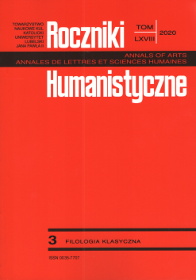Human Drama in Aristotle’s Poetics
Abstract
The aim of this paper is to present drama as it figures in Aristotle’s Poetics as a human event. According to the author, reversing the mechanism of imitation (mimesis) used to create tragedy makes it possible to treat the Poetics as primarily a bearer of knowledge about actual persons. The feelings of pity and fear that should be aroused by tragedy reveal the essence of human drama per se. Such drama results from the fact that a person faces evil in the sense of a deficiency or lack of something affecting such aspects of their life as their integrity or self-perfection. It thus manifests our human proneness to mistakes, as well as susceptibility to existential injury, and in so doing emphasizes the impermanence of the human situation and existence itself.
References
Aristotle. The Complete Works, edited by Jonathan Barnes. Princeton, NJ: Princeton University Press, 1991.
Belfiore, Elizabeth S. Tragic Pleasures: Aristotle on Plot and Emotion. Princeton, NJ: Princeton University Press, 1992.
Golden, Leon. “Aristotle on the Pleasure of Comedy.” In Essays on Aristotle’s Poetics, edited by Amélie Oksenberg Rorty, 379–386. Princeton, NJ: Princeton University Press, 1992.
Halliwell, Stephen. Aristotle’s Poetics. Chicago, IL: University Chicago Press, 1998.
Heath, Malcolm. “Aristotelian Comedy.” The Classical Quarterly 39, no 2(1989): 344–354.
Heath, Malcolm. “The Universality of Poetry in Aristotle’s Poetics.” The Classical Quarterly” 41, no 2(1991): 389–402.
Husain, Martha. Ontology and the Art of Tragedy. An Approach to Aristotle’s Poetics. New York, NY: University of New York Press, 2002.
Jaspers, Karl. Psychologie Der Weltanschauungen. Berlin: Springer Verlag, 1960.
Kiereś, Henryk. Człowiek i sztuka. Lublin: Polskie Towarzystwo Tomasza z Akwinu, 2006.
Rapp, Christof. “Tragic Emotions.” In A Companion to Ancient Aesthetics, edited by Pierre Destrée, Penelope Murray, 438–454. Malden–Oxford–Carlton, NJ: Blackwell Publishing, 2015.
Rorty, Amélie Oksenberg, ed. Essays on Aristotle’s Poetics. Princeton, NJ: Princeton University Press, 1992.
Sherman, Nancy. “Hamartia and Virtue.” In Essays on Aristotle’s Poetics, edited by Amélie Oksenberg Rorty, 177-196. Princeton, NJ: Princeton University Press, 1992.
Stein, Edith. On the Problem of Empathy. Translated by Waltraut Stein. Washington, WA: ICS Publications, 1989.
Storey, Ian Christopher, and Arlene Allan. A Guide to Ancient Greek Drama. Malden–Oxford–Carlton, NJ: Blackwell Publishing, 2005.
Schütrumpf, Eckhart. “Traditional Elements in the Concept of Hamartia in Aristotle’s Poetics.” Harvard Studies in Classical Philology 92(1989): 137–156.
Tischner, Józef. Filozofia dramatu. Kraków: Znak, 2006.
Tonner, Philip. “Action and Hamartia in Aristotle’s Poetics.” “E – LOGOS”, ELECTRONIC JOURNAL FOR PHILOSOPHY/2008. Accessed: December 21, 2017. http://nb.vse.cz/kfil/elogos/history/tonner08.pdf.
Tsitsiridis, Stavros. “Mimesis and Understanding: an Interpretation of Aristotle’s Poetics 4.1448b4 – 19.” The Classical Quarterly 55, no 2(2005): 435–446.
Ziemiański, Stanisław. “Zło fizyczne i moralne w świetle arystotelesowskiej koncepcji bytowego braku.” Studia Philosophica Wratislaviensia 12, fasc. 3(2017): 35–42.
Copyright (c) 2020 Roczniki Humanistyczne

This work is licensed under a Creative Commons Attribution-NonCommercial-NoDerivatives 4.0 International License.





